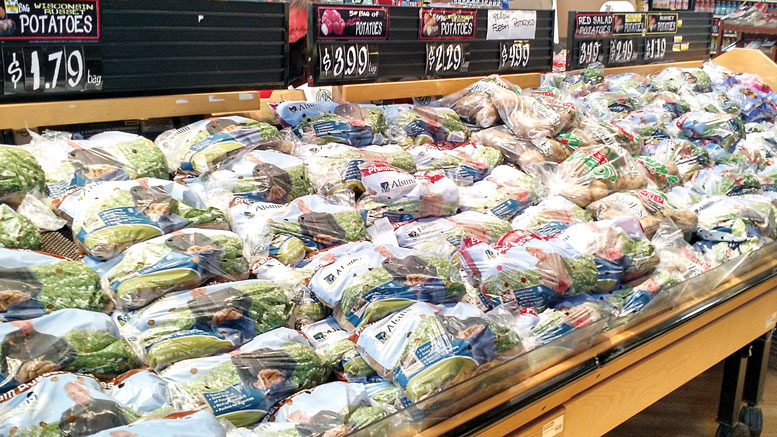Wisconsin Potatoes Positioned For Success
October 12, 2021 | 4 min to read
Wisconsin, a leading potato producer in the U.S., benefits from its strategic location, providing logistical advantages for retailers in the Midwest and East. With diverse potato varieties and a local focus, Wisconsin supports sustainability and community engagement, enabling consumers to access fresher produce while reducing carbon footprints. The Healthy Grown program showcases growers' commitment to environmental stewardship, meeting the rising demand for responsible sourcing and fostering connections between consumers and farmers amidst growing interest in local foods.

Midwest potato powerhouse aids logistics, local and sustainability programs.
Originally printed in the September 2021 issue of Produce Business.
As one of the biggest U.S. potato-producing states, Wisconsin offers many advantages to Midwestern and Eastern retail buyers. While the Badger State is one of the nation’s largest potato producers, the state’s geographic location and other advantages are of benefit to supermarket retailers serving a large part of U.S. population.
“Wisconsin ranks 3rd in the nation and No. 1 East of the Mississippi River for potato production,” states Dana Rady, director of promotion, communication and consumer education for the Wisconsin Potato & Vegetable Growers Association, Inc., based in Antigo, WI. “On average, the state produces 63,000 acres of potatoes each year. Wisconsin also produces the most potato varieties of any state, which means diversity and versatility with meals for consumers.”

Wisconsin’s location adjacent to large Midwestern metropolitan areas helps reduce food miles. “Wisconsin potatoes offer a logistical advantage to retailers east of the Mississippi River, allowing for a quicker response to order needs and quicker delivery, resulting in fresher product for retailers and wholesalers as well as consumers,” says Christine Lindner, marketing manager for Alsum Farms & Produce, Inc., headquartered in Friesland, WI.
Production volume plus geographic location favor potatoes grown and shipped from Wisconsin.
“Wisconsin is the third largest producer of potatoes in the U.S., and its proximity to markets to the East and to the West make us the answer to the transportation woes hitting other states,” says Rachel Atkinson-Leach, director of category and brand management for RPE, Inc., Bancroft, WI. “The varietal mix, including reds, yellows, organics, specialty and the creamy Russet Norkotahs, and packaging options from cartons to paper make Wisconsin a perfect buyers’ paradise for all types of foodservice, club and grocery outlets.”
Wisconsin potatoes are marketed heavily in the Midwest and East of the Mississippi River. “Regional alignment will continue to be advantageous as a retail growth strategy due to the escalating costs of business, from growing the crop the rise in packaging for corrugated bins, pallets, labor to pack and fuel for freight deliveries are all putting upward pressure on the market,” explains Lindner.
Local/Sustainable Focus
Wisconsin potatoes help feed local interest. “By buying local and supporting local growers, consumers in the Midwest are getting a fresher product at a lower carbon footprint, which means their food has to travel less miles to get to their home than when buying produce from other geographic regions,” says Rady. “Buying local and getting a fresher product at a lower carbon footprint is definitely a focal point here. Consumers today want to know where their food comes from and how it’s produced. When retailers support Wisconsin farmers, they are supporting their local businesses and economies, which is only to their (and everyone else’s) benefit.”
With today’s shoppers seeking more information about how their food is grown and produced, retail and foodservice partners are vital in bringing consumers and farmers together to share knowledge and build trust and confidence in our food supply while putting a face to the farmer. As shoppers look to provide healthy choices for their families, locally grown and produced products provide that value, notes Lindner.
“Major retailers support locally-grown produce as they seek partnerships with local farmers to provide fresh produce as they expand in the Midwest,” says Lindner. “Retail partners have recognized the local movement, and it has been a benefit for farmers to engage and create a farm-to-fork connection in marketing campaigns, in-store samplings and promotions.”
COVID affected all areas of the economy and boosted potato sales. “The pandemic brought a lot of attention to the versatility and variety of potatoes,” explains Atkinson-Leach. “It also brought people closer to each other and fostered a desire to connect with where their food comes from. Potato merchandising featuring Wisconsin potato farmers sharing their passion as a part of Buy Local programs on bins, packaging, recipes and in circulars will help build beautiful displays and drive excellent category growth.”
Wisconsin growers also take the conservation of Mother Nature’s resources seriously. As part of its Healthy Grown third-party certification program, started in the late 1990s, growers work closely with ecologists and conservationists to restore natural ecosystems, prevent erosion and support native plants and animals. “This is all to maintain the highest level of sustainability and ensure the land they farm is in the best condition for future generations,” says Rady.
Beyond Wisconsin’s Midwestern location, the Healthy Grown program brings awareness to potato growers’ daily land stewardship. “This forward-thinking marketing program creates a brand for eco-friendly Wisconsin grown potatoes and communicates our commitment to consumers that they are getting a product that is grown in a sustainable manner,” explains Lindner.
As more customers implement corporate responsibility initiatives, they look to their supply partners for formalized Integrated Pest Management, pollinator and sustainability programs being conducted on farm and throughout the food chain. “The Healthy Grown program provides growers measurable sustainability standards that are important to our customers. It can also serve as a point of differentiation with our customers,” adds Lindner.
8 of 14 article in Produce Business October 2021

